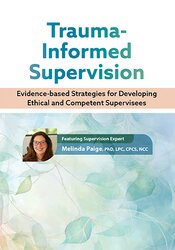
Given the prevalence of trauma, no doubt your supervisees’ caseloads are filled with clients who have experienced deeply distressing circumstances.
Effective supervision of trauma cases requires specialized knowledge and skills - without this foundation, you risk harm to clients and supervisees…
...and make the ethical misstep of practicing outside of the bounds of your competency.
That’s why we’ve created this training! Watch Dr. Melinda Paige, founder of the Institute for Trauma Competency, who will use her 25 years of experience helping thousands of supervisors and supervisees alike become trauma competent clinicians to give you the tools and techniques you need to improve your clinical supervision outcomes.
With specific, step-by-step guidance, you’ll upgrade your supervision skills and learn:
Finish this training knowing that you are practicing ethically and within the bounds of your competency by utilizing evidence-based clinical supervision practices!
Purchase Now!
Planning Committee Disclosure - No relevant relationships
All members of the PESI, Inc. planning committee have provided disclosures of financial relationships with ineligible organizations and any relevant non-financial relationships prior to planning content for this activity. None of the committee members had relevant financial relationships with ineligible companies or other potentially biasing relationships to disclose to learners. For speaker disclosures, please see the faculty biography.
Continuing education credit information is coming soon for this non-interactive self-study package.
CEs may be available for select professions, as listed in the target audience. Hours will be dependent on the actual recording time. Please check with your state licensing board or organization for specific requirements.
There may be an additional fee for CE certificates. Please contact our Customer Service at 1-800-844-8260 for more details.
**Materials that are included in this course may include interventions and modalities that are beyond the authorized practice of your profession. As a licensed professional, you are responsible for reviewing the scope of practice, including activities that are defined in law as beyond the boundaries of practice in accordance with and in compliance with your professions standards.

Melinda Paige, PhD, LPC, CPCS, NCC, is a licensed professional counselor supervisor and a national certified counselor who specializes in resilience and trauma. Dr. Paige earned a PhD in counselor education and supervision and has spent the last twenty years serving as a trauma-competent clinician and clinical supervisor.
Dr. Paige is also a clinical mental health counseling and supervision professor and subject matter expert for trauma impact and counseling curricula. She is the founder of the Institute for Trauma Competency and developed her Trauma Competent Clinician® model based on her qualitative research. She is the recipient of the American Counseling Association Professional Development Award, the Chi Sigma lota International Outstanding Practitioner Award, and the Chi Sigma lota International Outstanding Faculty Award. Dr. Paige has published and presented nationally on resilience and trauma-competent counseling and clinical supervision.
Known for her engaging teaching style, Dr. Paige offers both live and online training and consultation to mental health professionals in competency-based trauma mental health and resilience. Her professional expertise has also made her a sought-after media guest, and she has appeared on NPR affiliates and other national media outlets. She is the founding secretary of the International Association for Resilience and Trauma Counseling, a division of the American Counseling Association.
Speaker Disclosures:
Financial: Dr. Melinda Paige is the Founding Director of the Institute for Trauma Competency, LLC. She has employment relationships with Atlanta Relationship Institute. Capella University and Georgia State University. Dr. Paige receives a speaking honorarium from PESI, Inc. She has no relevant financial relationships with ineligible organizations.
Non-financial: Dr. Melinda Paige is a member of the American Counseling Association, the Association of Counselor Education and Supervision, the International Association for Resilience and Trauma Counseling, the Military and Government Counseling Association, and the Licensed Professional Counselors Association of Georgia.
Access never expires for this product.
Visit our FAQ page at www.pesi.com/faq or contact us at www.pesi.com/info
Foundations of Trauma-Competent Supervision
Methods of Trauma-Competent Supervision
Ethical Issues in Trauma-Specific Supervision
Evaluation of Trauma-Competent Supervisees
Prevent Vicarious Traumatization and Secondary Traumatic Stress
Build Vicarious Resiliency
Trauma-Informed Beliefs and Attitudinal Conditions in Clinical Supervision
Beyond Self-Care: Restorative Practices in Clinical Supervision
Satisfaction Guarantee
Your satisfaction is our goal and our guarantee. Concerns should be addressed to: PO Box 1000, Eau Claire, WI 54702-1000 or call 1-800-844-8260.
ADA Needs
We would be happy to accommodate your ADA needs; please call our Customer Service Department for more information at 1-800-844-8260.
PESI Mobile App
Access CE trainings on your phone or tablet through our free mobile app. Choose video or audio-only versions of online courses from the world’s best instructors, and complete your CE requirements anywhere, anytime, at your own pace.
Please wait ...